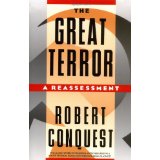National Review has published two outstanding articles on Robert Conquest. George Will writes that if books can change history, Conquest’s certainly did.
Will quotes one flabbergasting passage from “The Great Terror.” The context is the preparation for the great purge that saw Stalin eliminating, among others, the two Bolshevik leaders Zinov’ev and Kamenev. At first–before they all “confessed” to crimes they never committed, because of party discipline, the need to protect their families, and Stalin’s insincere offer to save their life in exchange for “truth” (they were of course later executed)–Kamenev was hard to get to “confess.” Stalin thus asked Mironov, the NKVD official charged with Kamenev’s “confession:”
“Do you know how much our state weighs, with all the factories, machines, the army, with all the armaments and the navy?”
Mironov and all those present looked at Stalin with surprise. “Think it over and tell me,” demanded Stalin. Mironov smiled, believing that Stalin was getting ready to crack a joke. But Stalin did not intend to jest. . . .
“I’m asking you, how much does all that weigh?” he insisted. Mironov was confused. He waited, still hoping Stalin would turn everything into a joke. . . .
Mironov . . . said in an irresolute voice, “Nobody can know that. . . . It is in the realm of astronomical figures.”
“Well, and can one man withstand the pressure of that astronomical weight?” asked Stalin sternly.
“No, answered Mironov.
“‘Now then, don’t tell me any more that Kamenev, or this or that prisoner, is able to withstand that pressure. Don’t come to report to me,” said Stalin to Mironov, “until you have in this briefcase the confession of Kamenev!”
John O’Sullivan has a longer article, which answers an obituary run by “The Guardian” and written by Eric Homberger. It is a strong response, highly recommended.
John reviews quite a few Conquest’s obituaries. He found one particularly telling:
A charming personal version of such a tribute at arms’ length, originally broadcast, is available on the BBC website. Its author, Stephen Evans, the grandson of a devout Welsh Stalinist, describes how reading The Great Terror and being impressed by its methodical accumulation of the overwhelming evidence of mass murder liberated him from the ideological prison in which he had been brought up. Such an account explains the collective, gradual, often reluctant awakening to the truth that Bob’s two great books delivered to thousands, even millions, of readers.
Indeed, if books can change history, Conquest’s did.
PS: I read The Great Terror in high school and I am re-reading it now. I remember it made a big impression on me, but I did not remember how well written a book is. It is a story well told. A dreadful story that may keep you awake at night.


READER COMMENTS
Kevin Erdmann
Aug 23 2015 at 3:03pm
It looks like the O’Sullivan link is broken.
David R. Henderson
Aug 23 2015 at 6:07pm
@Thanks, Kevin. Link fixed.
Faze
Aug 23 2015 at 6:23pm
[Comment removed for supplying false email address. Email the webmaster@econlib.org to request restoring your comment privileges. A valid email address is required to post comments on EconLog and EconTalk.–Econlib Ed.]
Richard O. Hammer
Aug 24 2015 at 7:38am
What surprises me is that I cannot remember ever hearing of Robert Conquest or his books until Peter Boettke posted about Conquest’s death on August 6. I’ve read books by Solzhenitsyn, Sakharov, Mises. Biographies of Lenin and Stalin by Louis Fischer. Darkness at Noon by Koestler. And others. So I do not understand why Conquest did not come to my attention earlier.
Comments are closed.